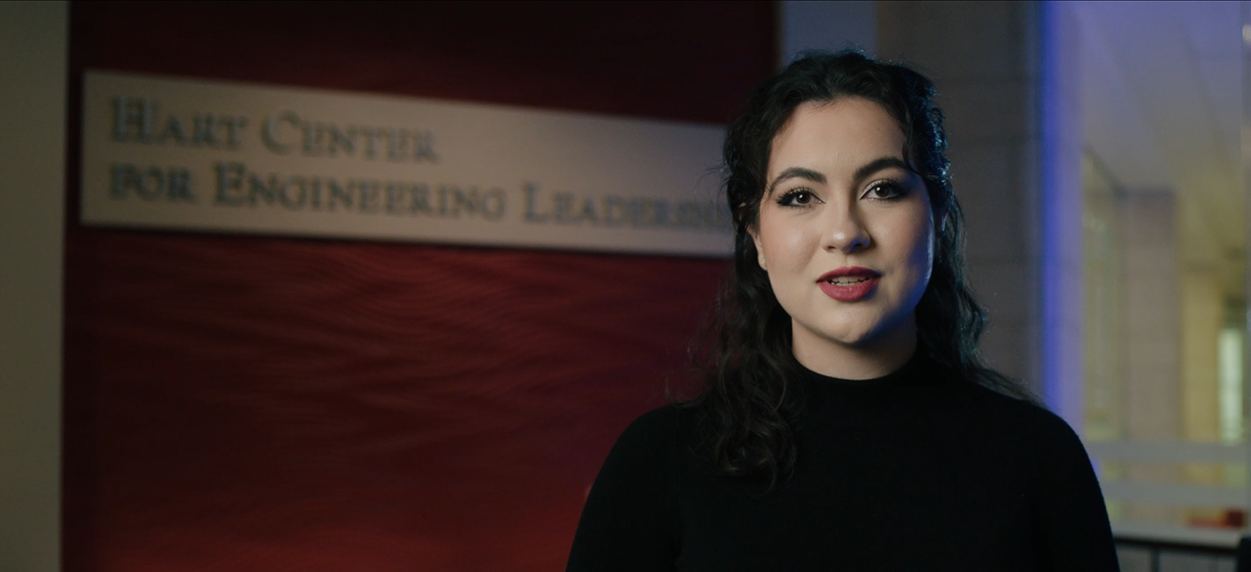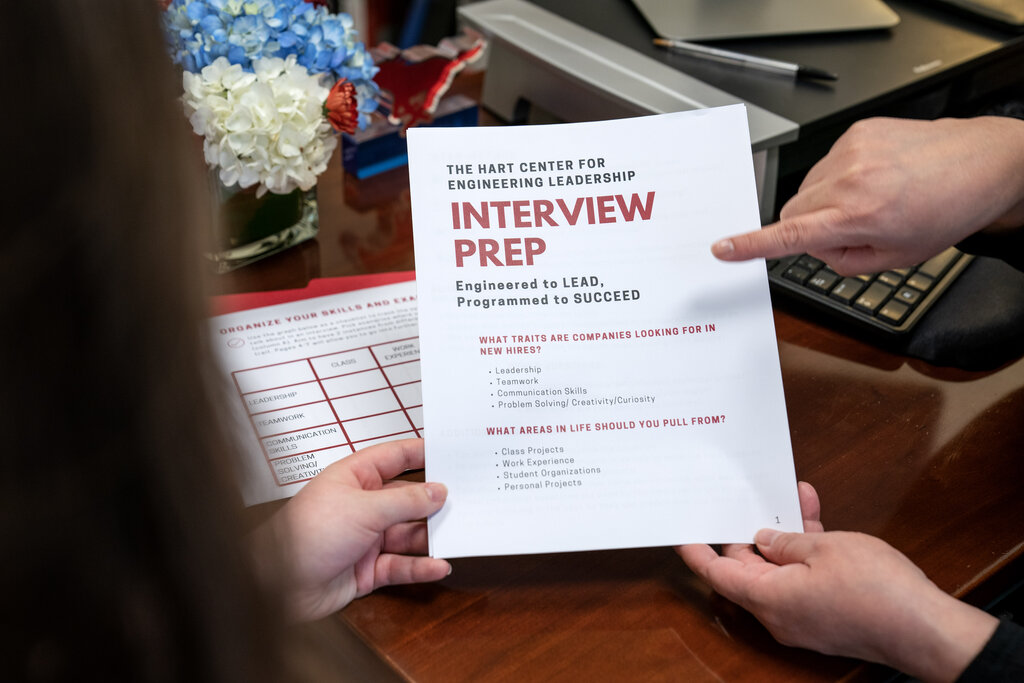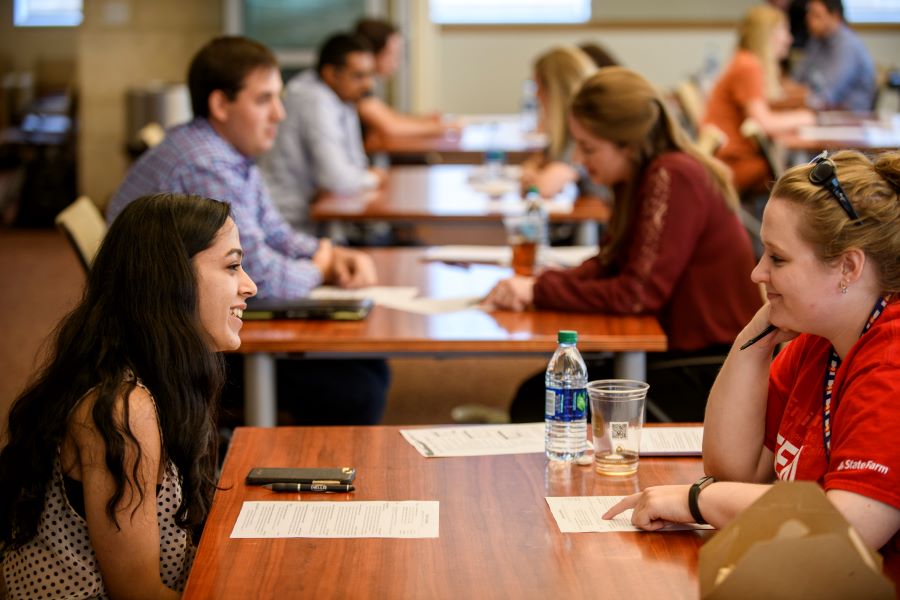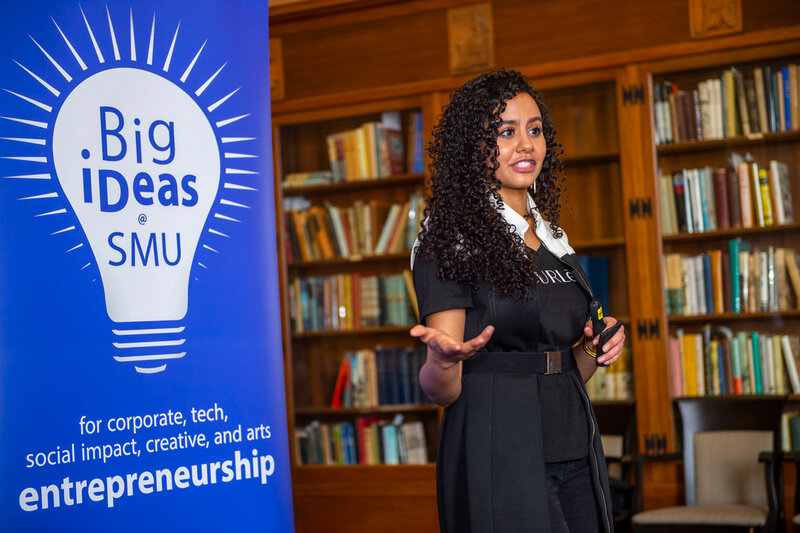Nurturing a competitive edge: SMU Lyle combines technical training with leadership and soft skills preparation
SMU Lyle’s Hart Center for Engineering Leadership gives engineering students a competitive edge by supplementing their technical education with leadership certification and soft skills training.

For SMU Lyle engineering students, the Hart Center for Engineering Leadership bridges the gap between technical skills learned in the classroom and real-world leadership and soft skills needed to give them a competitive edge.
The Hart Center’s services – offered free-of-charge to SMU Lyle students – include assessments to evaluate core competencies, creation of a personal development plan, 1:1 mentorship, and advising to ensure students’ academic and career goals are aligned. The center also provides resume reviews, career preparation, mock interviews and offer negotiations, working with students one-on-one to cultivate the tools and skills that most appeal to recruiters.
“When I was in school, there wasn’t an emphasis on soft skills; you come out of college being book smart,” says Mike Mignardi, undergraduate mentor at the Hart Center, who served more than three decades as a technology development manager before retiring from Texas Instruments. “At the Hart Center, students come out with the know-how to work with teams to problem-solve and resolve conflicts. That is a paradigm shift that complements the students so that they are much more attractive to and productive in the workforce.”
Center created in answer to national call for engineering leadership
Kathy Hubbard, interim director of the Hart Center and associate dean of diversity and inclusion for SMU Lyle, was tasked with creating a leadership center at Lyle in 2008. At the time, it was in answer to a national call for more engineering leadership. The Hart Center for Engineering Leadership was named in 2010 for Linda and Mitch Hart. In its early years, the center collaborated with the Center for Creative Leadership to create its leadership-training framework.
“They helped develop competencies for students to lead themselves, lead and work well with others, lead others and get things done,” Hubbard says.
The staff at the Hart Center teaches students to hone their career goals and value their worth. All roles are valuable to the successful direction of an organization, Hubbard says.
“Leadership is the knowledge, skills and abilities to set direction and align to achieve goals and to influence and inspire others to be committed to goals,” she says. “Leading yourself helps you be a better leader.”
— Learn more about SMU Lyle's Hart Center for Engineering Leadership —
Hart Center’s leadership certificate program
Brian Rosenberg ‘21, program director for the Lyle Graduate Leadership Certificate program, spent 30 years as a senior executive with Fortune 500 and larger companies before switching gears to earn a master’s degree in conflict management and dispute resolution. He used his master’s thesis project to build a leadership program specifically designed for engineers.
“We start by understanding how they function: What are their top five strengths and how are they applying those strengths and characteristics,” Rosenberg says. “It’s pulling out of the students the things that are their strengths and figuring out what is blocking them, ultimately, from their own success.”
Rosenberg helps students by empowering them to make their own choices. He provides one-on-one situational guidance, which often includes teaching how to work with difficult people and unlock potential in others.
As of this semester, the Graduate Leadership Certificate program has matriculated approximately 100 students.
“SMU provides opportunities,” Mignardi says. “With the Hart Center, (students) come out with the know-how to work with teams to problem solve and solve conflicts. And they learn how to do this in real time.”
Mignardi encourages students to utilize everything the Hart Center offers, including working with groups like the Society of Women Engineers, the Society of Hispanic Professional Engineers, and the National Society of Black Engineers. These groups form teams that collaborate on nonprofit or academic projects to assess and solve problems, often working with non-engineering students as well.
Increasing utilization
Currently, only about 20% of SMU Lyle engineering students utilize the Hart Center’s services. Hubbard and her team are working hard to change that.
“Our message is to take advantage of all opportunities,” says Linda Parker, director of career development for the center. “If you pay attention to opportunities and resources, you will go far in life. The hardest part about my job is meeting students who have never walked through the door until after they’ve graduated.”
Parker works with employers and students to create engagement. Her favorite part of the job is negotiating offers between students and their future employers.
“I crunch the data and know what a good starting offer is,” Parker says. “We talk about strategy and if [the students] ask for more money, for example, we work on what to say together and [they] tweak the final version. I had a student come in yesterday who’d received an offer, but it was less than she thought it would be. We were able to craft an email to ask for more money and she was able to get 10% more than the original offer.”
The joy of helping students figure out their place — and accomplish their goals — is one of the best parts of the job for Misti Compton, director of undergraduate advising and student records at SMU Lyle.
“Our mission is all about the student and supporting the student in any way we can,” she says. “Providing all of those students services so they succeed academically; providing support when they’re struggling; and connecting their academic plan to their career goals — we help connect the dots.”
For today’s challenges, technical expertise isn’t enough
Robert Amponsah, assistant director of leadership and development for the Hart Center, is working with Hubbard to evolve Hart Center’s programs so they span the entire academic journey. For undergrads, this would provide a capstone that shows a student’s arc of progress over their studies at SMU. For graduate students, this would provide a refined pathway depending on whether the student plans to pursue a Ph.D. or go directly into industry.
“In the industry, it’s not enough to just be the expert,” Amponsah says. “It’s translating information and getting people to care about what you’re talking about.
“How do you communicate so that people will listen, and you can lead?”
The leaders are creating an experiential learning model in which students would be placed in a challenging environment with support.
“Engineering is hard as it is,” Amponsah says. “We want to put that supportive environment in place so (students) can learn in a safe environment.”
Leadership is a skillset that allows students to connect people and address problems in a way that provides value to stakeholders, Amponsah says.
“At the end of the day, leadership plays a role in building community,” he says. “We want all students to feel as if they have a space where they can work across fields to build community.”
Hubbard’s vision for the future of the Hart Center for Engineering Leadership is that it becomes central to the experience of all SMU Lyle students.
“We take our students’ leadership and career development as seriously as we take their technical development. The Hart Center is the lifeblood of what they do here.”
About the Bobby B. Lyle School of Engineering
SMU’s Lyle School of Engineering, founded in 1925, is one of the oldest engineering schools in the Southwest. The school offers twelve undergraduate and 29 graduate programs, including master’s and doctoral degrees, in the departments of Civil and Environmental Engineering; Computer Science; Electrical and Computer Engineering; Mechanical Engineering and Operations Research and Engineering Management.
About SMU
SMU is the nationally ranked global research university in the dynamic city of Dallas. SMU’s alumni, faculty and nearly 12,000 students in eight degree-granting schools demonstrate an entrepreneurial spirit as they lead change in their professions, community and the world.


